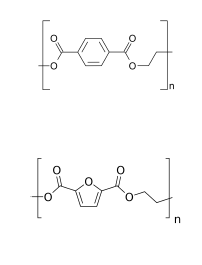
Currently, plastic waste is a significant problem; 5.3 billion tonnes of plastics are not recycled. These plastics are not recycled because their are dumped in oceans or landfills. This research focuses on the classification of new bio-plastics for future recycle plants. The classification of these plastics will be done by convolutional neural networks (CNN) in combination with hyperspectral imaging. Two different CNNs are tested with two different optimizers each. The CNNs are trained on four different data sets. The networks that are chosen for this research are DeepLabV3+ and U-Net and a Mini network. DeepLabV3+ is chosen because this network achieved a new state of the art performance on two public data sets. U-Net is chosen because it has established itself by previous research as a good network for the classification of polymers. Mini-Net is chosen because it represents the current method of plastic classification. Based on the co-polymer dataset U-Net is the best performing network with an F1-score of 99.1% and an IoU of 99.2%, and these results give a good indication that CNNs are capable of detection bio-plastics and co-polymers.
Click here for the Paper(Private) and the PosterBart Riesebos

